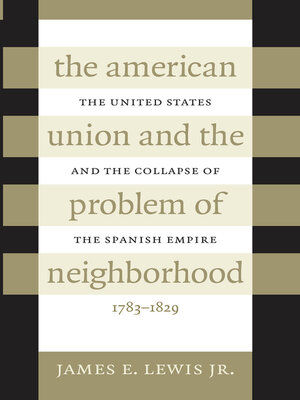The American Union and the Problem of Neighborhood
ebook ∣ The United States and the Collapse of the Spanish Empire, 1783-1829
By James E. Lewis Jr.

Sign up to save your library
With an OverDrive account, you can save your favorite libraries for at-a-glance information about availability. Find out more about OverDrive accounts.
Find this title in Libby, the library reading app by OverDrive.



Search for a digital library with this title
Title found at these libraries:
| Library Name | Distance |
|---|---|
| Loading... |
In this book, James Lewis demonstrates the centrality of American
ideas about and concern for the union of the states in the
policymaking of the early republic. For four decades after the
nation's founding in the 1780s, he says, this focus on securing a
union operated to blur the line between foreign policies and
domestic concerns. Such leading policymakers as Thomas Jefferson, James Madison, James Monroe, John Quincy Adams, and Henry Clay worried about the challenges to the goals of the Revolution that would arise from a hostile neighborhood—whether composed of new nations outside the union or the existing states following a division of the union.
At the center of Lewis's story is the American response to
the dissolution of Spain's empire in the New World, from the
transfer of Louisiana to France in 1800 to the independence of
Spain's mainland colonies in the 1820s. The breakup of the
Spanish empire, he argues, presented a series of crises for the
unionist logic of American policymakers, leading them, finally,
to abandon a crucial element of the distinctly American approach
to international relations embodied in their own federal union.
ideas about and concern for the union of the states in the
policymaking of the early republic. For four decades after the
nation's founding in the 1780s, he says, this focus on securing a
union operated to blur the line between foreign policies and
domestic concerns. Such leading policymakers as Thomas Jefferson, James Madison, James Monroe, John Quincy Adams, and Henry Clay worried about the challenges to the goals of the Revolution that would arise from a hostile neighborhood—whether composed of new nations outside the union or the existing states following a division of the union.
At the center of Lewis's story is the American response to
the dissolution of Spain's empire in the New World, from the
transfer of Louisiana to France in 1800 to the independence of
Spain's mainland colonies in the 1820s. The breakup of the
Spanish empire, he argues, presented a series of crises for the
unionist logic of American policymakers, leading them, finally,
to abandon a crucial element of the distinctly American approach
to international relations embodied in their own federal union.







